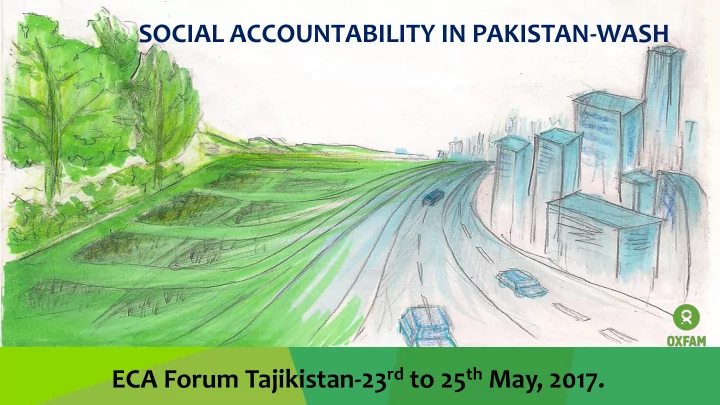

SOCIAL ACCOUNTABILITY IN PAKISTAN-WASH ECA Forum Tajikistan-23 rd to 25 th May, 2017.
Improving WASH Governance & Social Accountability • Unaddressed water sanitation and hygiene needs in urban areas • Finding collaborative solutions through public government partnerships ( Participative governance & social accountability)
Projects picture gallery
BEFORE INTERVENTION • Increasing urbanisation is exceeding government’s capacity • The decentralisation has not reached municipal level (local level) • Limited social accountability of the government at municipal level • National/sub national policies exited but gap in awareness and practice (e.g. Right to Information Act, Consumer protection Act, national drinking water policy etc)
BEFORE INTERVENTION • Urban WASH is overseen by multiple departments that results in • ad-hoc WASH planning, • blurred zones of responsibility, • overlapping of roles and responsibilities, • and complicates monitoring and reporting- (Oxfam-UWGA 2015)
INTERVENTIONS FOCUS • Poor communities demand effective WASH services as their rights from duty bearers/service providers • Responsive and improved WASH governance and services in collaboration with public and private
INTERVENTIONS • Organising communities to give them voice as Effective Citizen Groups • Sensitisation of stakeholders on existing policies (e.g. Right to Information Act, Consumer protection Act, national drinking water policy and social accountability tools) • WASH sub committees trained on technical aspects (operation & maintenance)
INTERVENTIONS • Formulation of Local level Urban development plans by relevant Govt. representative and line departments through participatory approaches • Introduced catalytic fund to expedite results and maintain community and government engagement • Engaging women at all levels
EXAMPLES • Mr. Gul submitted 125 applications to local departments and followed up for regular cleaning. • The government built 180 running square foot drainage system with community contribution
EXAMPLES • Ms Mehreen addressed the unhygienic conditions and solid waste issues in her neighbourhood by submitting an application to get the duty schedule list of sanitary workers to identify ghost employees
EXAMPLES Due to cultural barriers, women would never go and ask a male shopkeeper for sanitary napkins. Ms. Shamshad opened a home based shop to sell sanitary napkins to benefit the women and generate income for herself
KEY Learning • Having an organized platform gives confidence to community to raise issues • Social accountability challenges the status quo and makes the government responsive to local issues • Evidence-based approaches are a powerful tool to hold decision makers accountable. • Social accountability effectively utilizes the existing government resources
ENABLING FACTORS • Participative and inclusive analysis and planning based on evidence • Sensitisation of stakeholders on existing policies (e.g. Right to Information Act, Consumer protection Act, national drinking water policy and social accountability tools etc) • Role of media (independence, high lighting ground issues) • Introducing catalytic fund to expedite results and maintain community and government engagement
BARRIERS/ CHALLANGES • Mobilisation of urban community • Lack of social cohesion • Coordination with multiple stakeholders • Turnover in government officials • Media/mafia demanding undue favour • Institutional financing to government does not ensure social accountability • Political interests
Thank You "When the people become involved in their government, government becomes more accountable, and our society is stronger, more compassionate, and better prepared for the challenges of the future." Arnold Schwarzenegger (Governor – California, USA) Dr. Syed Hasnain Ali Abbas Email: shali@oxfam.org.uk
Recommend
More recommend